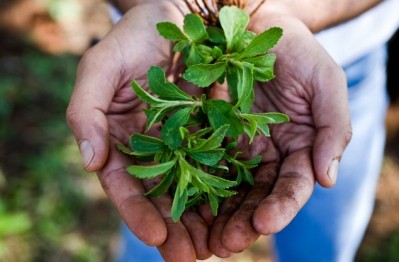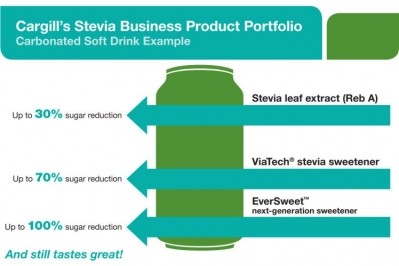Senomyx achieves proof of concept for fermentation strain to produce novel natural high intensity sweetener

The sweetener - which would be described on food labels as 'siratose’ - is claimed to be far superior to commercially available monk fruit extracts, and more potent, better-tasting, more soluble, and more stable in low PH beverages such as carbonated soft drinks, than Reb-A (the best-known steviol glycoside).
"Senomyx scientists have developed two initial fermentation strains which produce siratose," said CEO John Poyhonen in a July 19 statement.
"At this time, both strains are producing siratose at very low levels, and we will need to optimize the most promising strain to support our desired yield and cost target for future commercialization. Reaching this milestone by our previously stated goal of mid-2018 keeps us on-track for a potential submission of our GRAS notification to the FDA by the end of 2019."
San Diego-based Senomyx, which uses proprietary taste receptor-based technologies to develop novel flavor ingredients, identified the sweetener after screening more than three million samples and identifying “nearly 300 sweeteners from 35 distinct families of sweeteners found in nature,” said the company.
"It's never been described in the literature and it's different than all of the monk fruit sweeteners that are on the market today. The primary sweetener in all the commercially available monk fruit extracts on the market is Mogroside V, which is very different than siratose."
John Poyhonen, CE, Senomyx
Is siratose produced via microbial fermentation considered 'natural'?
While fermentation is considered to be a 'natural' process for producing flavors, it is not clear whether consumers or plaintiff's attorneys would consider sweeteners produced this way to be as 'natural' as those derived directly from the stevia leaf or monk fruit, which can be described as leaf or fruit extracts on food labels.
Cargill and Evolva’s EverSweet sweetener, which is produced via a fermentation process using a genetically engineered baker’s yeast, for example, can be described on food labels as Reb D +M or steviol glycosides, but not as ‘stevia leaf extract.’
FlavorHealth is also developing a new natural sweetener (click HERE for more details) that it may produce via a fermentation process.
Alex Woo: 'The name 'siratose' on a product label is not very consumer-friendly...'
Speaking for FoodNavigator-USA last year, Alex Woo, Ph.D. chief executive at consultancy W2O Food Innovation and an expert on high potency sweeteners, said there were some potentially exciting sustainability benefits from producing food ingredients via fermentation rather than devoting vast swathes of agricultural land to growing plants that contain only trace levels of the compounds you are interested in.
However, siratose could hit some roadblocks, he predicted.
For a start, the name 'siratose' on a product label is not very consumer-friendly, he observed: "[If it is produced via] fermentation or enzymology, siratose is not extracted, so cannot be called 'monk fruit extract.' This parallels the label of 'stevia extract' for farm-based stevia, vs. 'Rebaudioside M' for fermentation-based stevia in the US. As Senomyx has already concluded, its label after it clears FDA GRAS will most likely be 'siratose.'
"Siratose sounds to me, a food scientist, like the bulk sweeteners tagatose, allulose, and ribose. But to consumers, it sounds like a 'chemical'."
However, if consumers are educated about the sustainability benefits, the conversation could change, said Kantha Shelke, Ph.D., CFS, adjunct faculty, Johns Hopkins University and principal at Corvus Blue LLC: "Ecologically conscious consumers are becoming increasingly aware of the fact that extracting minor food ingredients from a plant can produce a lot of waste and may not be good for the environment, especially if the rest of that plant is not used viably."
Senomyx is still loss-making
Senomyx posted a net loss of $3.8m in the first quarter of 2018 on revenues of $3.1m, but has cash reserves of $18.1m and no debt.
The company “continues to conduct discussions with third parties in its evaluation of potential strategic alternatives, including the potential sale of the company, with the ultimate goal of enhancing shareholder value," said Poyhonen.
When will it launch? Senomyx has not provided a commercial launch date, but says it hopes to submit a GRAS notification by the end of 2019, which could mean a possible launch in 2020.
Is it ‘natural’? Much will depend on exactly how siratose - which is found naturally in monk fruit - is manufactured at a commercial scale. Senomyx says it plans to do so via a fermentation process, and not by extracting siratose from the natural source (monk fruit). A comparable product is Reb D+M being developed by Cargill and Evolva under the EverSweet brand, which Cargill has said in the past will not be actively marketed as a natural sweetener, although it is "chemically identical to what you’d extract from the stevia leaf."
Is it non-GMO? Senomyx has not said whether the micro-organism it may use to produce siratose is genetically engineered, although even if it is, it would likely not require a GMO label under the new federal GMO labeling law if the micro-organism is used as a processing aid and is not present in the final sweetener.




















